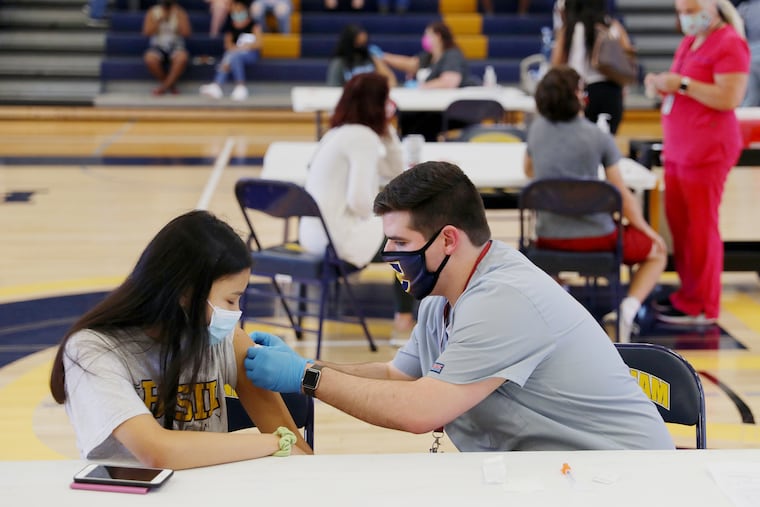The danger of ‘wait and see’ when it comes to vaccines for kids | Expert Opinion
As the Delta variant spreads, we have a narrow window of opportunity to get ahead of the pandemic, for the first time since COVID-19 hit.

Many parents in the United States are taking the “wait-and-see” approach or do not intend to get their children vaccinated against COVID-19 at all. A recent Harris poll found that while over half of parents with children between the ages of 12 and 17 years intend to get their children vaccinated and 9% have already done so, 25% of parents do not intend to get their child vaccinated at all. The top two reasons why these parents are hesitating: They want to wait for more research to prove the safety (51%) and effectiveness (37%) of the vaccines among children.
It is understandable why many parents are hesitant about their children getting the COVID-19 vaccine. Over the last 15 months, public health messaging, scientific research, and media coverage portrayed very low risks of children getting seriously ill with COVID-19, and children do not transmit the virus to others easily compared with older adults. In comparison, parents are faced with news reports of rare cases of teenagers diagnosed with mild myocarditis or pericarditis after receiving the COVID-19 vaccine. To some parents, the potential risk of vaccination is not worth the benefit of protecting their child against no or mild COVID-19. To other parents who have vaccinated their child, the benefits outweigh the risk.
But the delta variant, a highly contagious form of the novel coronavirus (B.1.617.2) that has spread to over 90 countries, increases the urgency to advise all parents to get their children vaccinated against COVID-19 as soon as possible.
The delta variant now makes up 20% of new U.S. cases and this proportion is doubling every two weeks, posing a great threat to the U.S. effort to eliminate COVID-19. It is imperative for the CDC, health departments, and pediatricians to urge every parent who has not already done so to get their child vaccinated as soon as the vaccine is authorized for their child’s age group.
We have a narrow window of opportunity to get ahead of the pandemic, for the first time since COVID-19 hit the world stage. Capitalizing on this window is mission-critical to stopping the surge of the delta variant in the U.S., where there is an ample supply of vaccines available at no cost to the public.
The delta variant is highly transmissible and associated with more serious illness than the original novel coronavirus and other known variants. A study in Scotland reported that the delta variant, making up over 90% of new COVID-19 cases in the United Kingdom, is associated with double the risk of hospitalizations compared with the alpha variant (the previous prevailing strain circulating in the U.K.). Hospitalizations among children due to the delta variant have also been increasing in recent weeks in the United Kingdom.
Although children were not the main sources of transmission of the virus in earlier waves of the pandemic, the recent surge in the new cases of the delta variant in the U.K. is attributed to transmission among young people ages 12 to 20 years who have lower vaccination rates than older adults. As the majority of adults become vaccinated, children who are not vaccinated could become reservoirs of the virus and allow new variants to arise and circulate in the population, especially with the push for fully reopening schools in the fall.
Some may argue that vaccinating children poses ethical considerations because they benefit less from the vaccine individually, given lower disease burden and the little evidence of secondary transmission from children to others. Should the limited global supply of vaccines instead be reserved for vaccinating people from more susceptible age groups in over 200 countries where vaccination programs are either hampered by scarcity in supply or where no vaccinations have begun?
These are valid critiques. However, whether right or wrong, we have a glut in vaccine supply in the U.S. The risks of serious illness of COVID-19 are not zero. Over 4,000 out of over 580,000 U.S. children (0-4 years old) and 2.8 million (5-17 years old) who had COVID-19 or were exposed to the virus were diagnosed with multisystem inflammatory syndrome in children (MIS-C). Since the beginning of the pandemic, 322 children have died from COVID-19 in the U.S. The delta variant is much more transmissible and more children who are unvaccinated may get infected, leading to more cases of MIS-C and deaths among children in coming months. In comparison, the reports of myocarditis or pericarditis after a COVID-19 vaccine are rare. Of the 4.2 million doses of the vaccine given to teens ages 12 to 17, the CDC received 152 reports of myocarditis or pericarditis within 21 days of receiving the second dose of a COVID-19 vaccine. The majority of these reported cases were mild and resolved with rest. The potential benefits of vaccinating children greatly outweigh the potential harms to children.
Our ability to end human suffering from the COVID-19 pandemic depends on protecting all populations, including children. We need all hands on deck to advise all parents to get their children who can receive the vaccine to get vaccinated against COVID-19 now.
Dr. Angela Shen is a captain in the U.S. Public Health Service, a visiting scientist at the Children’s Hospital of Philadelphia, and an associate professor at the School of Medicine and senior fellow at the Leonard Davis Institute of Health Economics at the University of Pennsylvania.
Dr. Andy Tan is an associate professor at the Annenberg School for Communication and senior fellow at the Leonard Davis Institute of Health Economics at the University of Pennsylvania.